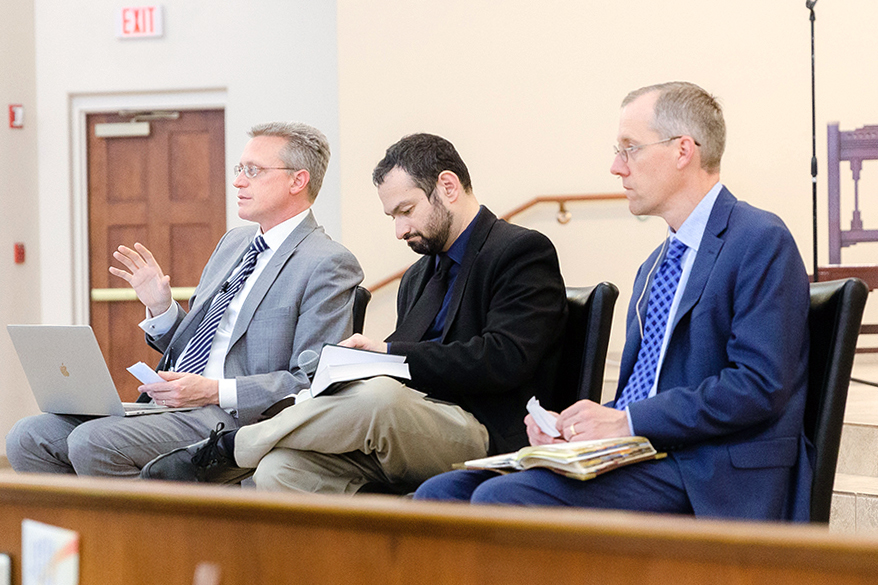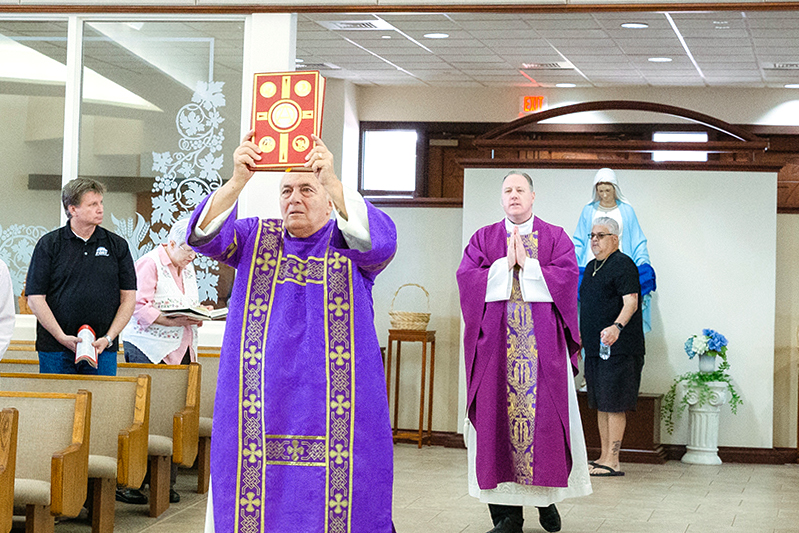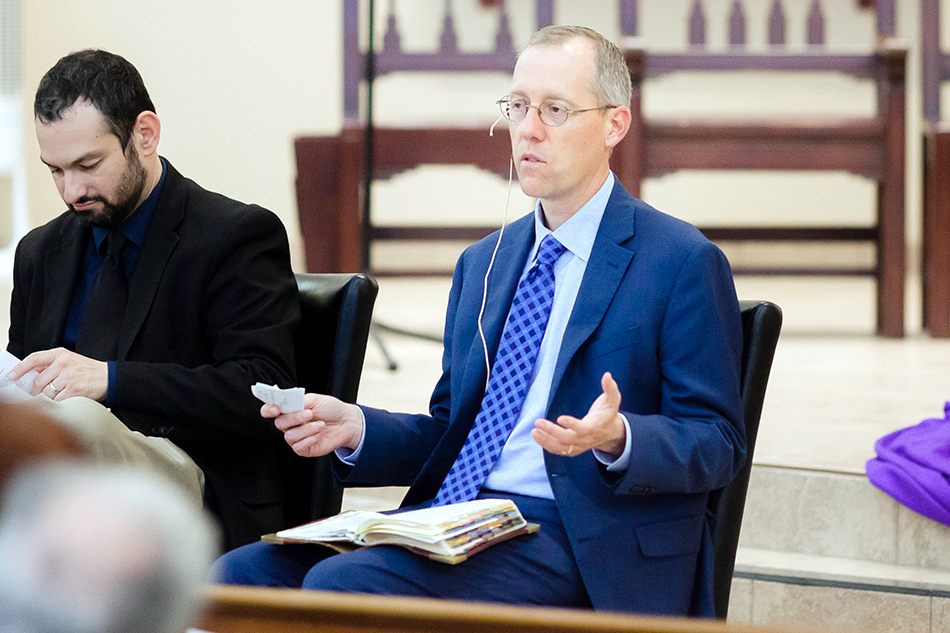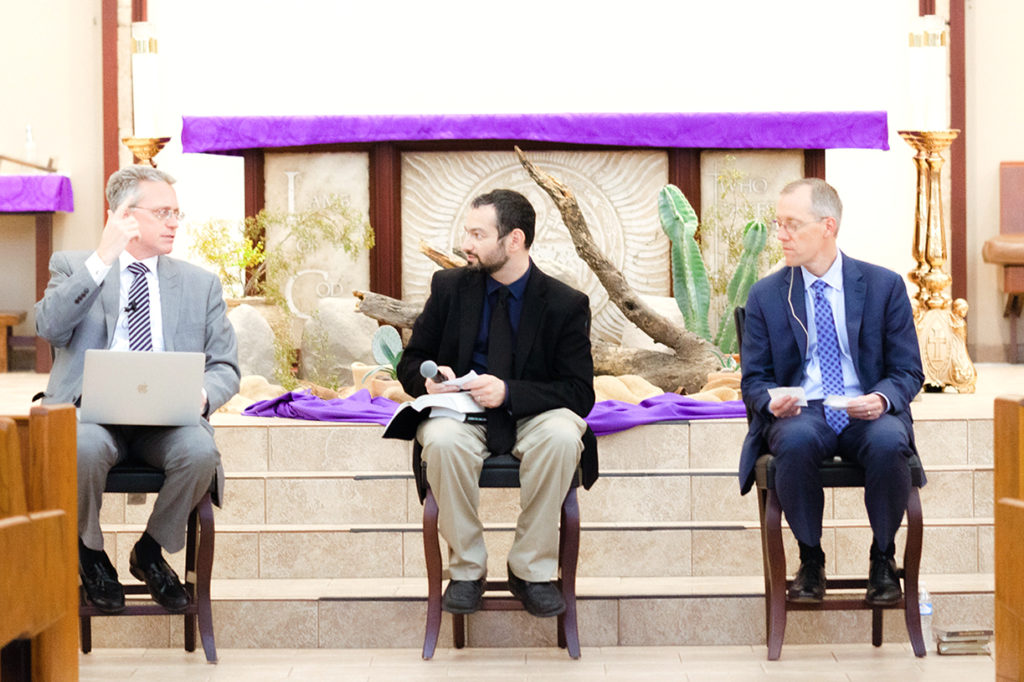

Employees forced to work at home. Restaurants and stores by the hundreds closed. Classrooms emptied of the familiar sights and sounds of children learning. The coronavirus pandemic has offered the world unprecedented challenges to daily living — and given Catholics an opportunity like none before to lean on God through His Word. That’s exactly what the Diocese of Phoenix’s first Biblical Studies Conference provided.
Held March 13-14 at Corpus Christi Parish in Ahwatukee, days before state and regional restrictions were put in place, the gathering planned months ago was billed as a chance to go deeper into Scripture under the leadership of seasoned academics who would discuss truths at the heart of Scripture.
The timing was uncanny.
“These are anxious times for a lot of people, but our faith gives us a perspective that [provides] us a peace and a calm. If we lack that, [circumstances] become much more magnified in terms of fear and anxiety,” said Dr. Timothy Gray, president and associate professor of Sacred Scripture at The Augustine Institute, a graduate school about 12 miles outside downtown Denver.
“I think our objective was successful, which was really to immerse people in the riches of Scripture. We really wanted to go deep into the Word of God,” said Fr. John Parks, vicar for evangelization for the Diocese of Phoenix.

Six discussions over two days led attendees through a series of topics such as overcoming temptations and challenges, grace and how most people misunderstand God. Other presenters included Dr. John Bergsma, a theology professor at Franciscan University in Steubenville, Ohio, and Dr. Michael Barber, a theology and Scripture associate professor at the Augustine Institute. Salvation, faith and trust in God remained consistent concepts throughout the discussions.
“Trust is at the heart of faith,” Gray told attendees during the final segment titled, “Can You Trust God?”
In an allusion to St. James’ teaching that faith without works is dead (Jas 2:17), Gray used the illustrations of the two Apostles most prominent in the early Church, Ss. Peter and Paul .
“What Paul suffered,” beatings, imprisonment, “to proclaim the Gospel shows his testimony was authentic. The same for Peter. And, they both died for their testimony. God needed authentic witnesses to convert the world,” Gray said. “If the faith is not viral and spreading, it is because our witness is not authentic. We’re not paying the price holiness requires.”
Mary Jo Kruse, a Corpus Christi parishioner who attended with her husband, Rick, said Gray’s point was a key one. “We can know a lot, but living it is what makes our faith and witness authentic. There is a lot of opportunity to do that now. Prayer is so important, too.”

Another of Gray’s examples, the contrast between Saul and David, the first and second kings of Israel, made an impression on Jack Henz, parishioner and catechist from St. Rose Philippine Duchesne in Anthem.
“Saul was into himself; he had no faith and trust in God; he was a political thinker. He ended up losing his kingdom and some of the tribes of Israel,” Henz said. “David, who committed terrible sins, had true faith and trust in God; that He would forgive him.”
The conference went beyond teaching.
In its final segment, participants asked the academics about a subject of their choice. In response to a question about the role the Dead Sea scrolls played in understanding the Letters of St. Paul, Bergsma said the scrolls use certain patterns of speech that show up later in Paul’s writings.
“Works of the law was one of the expressions he (St. Paul) used to refer to what was years later described as the Mosaic law in the Old Testament.” The concept was used by Bergsma to distinguish between salvation by works versus salvation by faith.

Barber addressed the meaning behind the phrase “full of grace” used to describe Mary. The words used in the Gospel of Luke by St. Gabriel the Archangel, who, in announcing to her that she would give birth to the Savior, indicated “she was always full of grace.” Barber noted that early scholars analyzed the language, using the Greek translation, to conclude the writer meant Mary was, in effect, the new Eve — a woman preserved from Original Sin.
These and other concepts explored by the trio of academics gave conference participants a clearer understanding of the Bible and essential means of deepening one’s faith, Fr. Parks said.
Later, at the conference’s closing Mass, Corpus Christi pastor, Fr. Chad King, used another New Testament example to urge the congregation to a deeper and more substantive walk with God. Describing the woman at the well (Jn 4:4-26), Fr. King said Jesus knew she needed more than a drink of water. Giving her Himself would open a life of faith in the Son of God.
“How about you? Is your faith welling up to eternal life?” Fr. King asked. “Is your love for God welling up to eternal life? Or perhaps your faith is stuck … in the earthly things you are wanting. Are you able to go deeper to what God wants for you? Are you willing to go deeper, to where He wants you to go?”
A sure pathway, according to Fr. Parks, in a time of uncertainty.
“There is a spirit of fear,” due to the coronavirus, he said. Diving into the theme that faith is often the combatant to fear, “often God says, ‘Do not be afraid’ in Scripture — I think it’s a great time to hear that message.”





